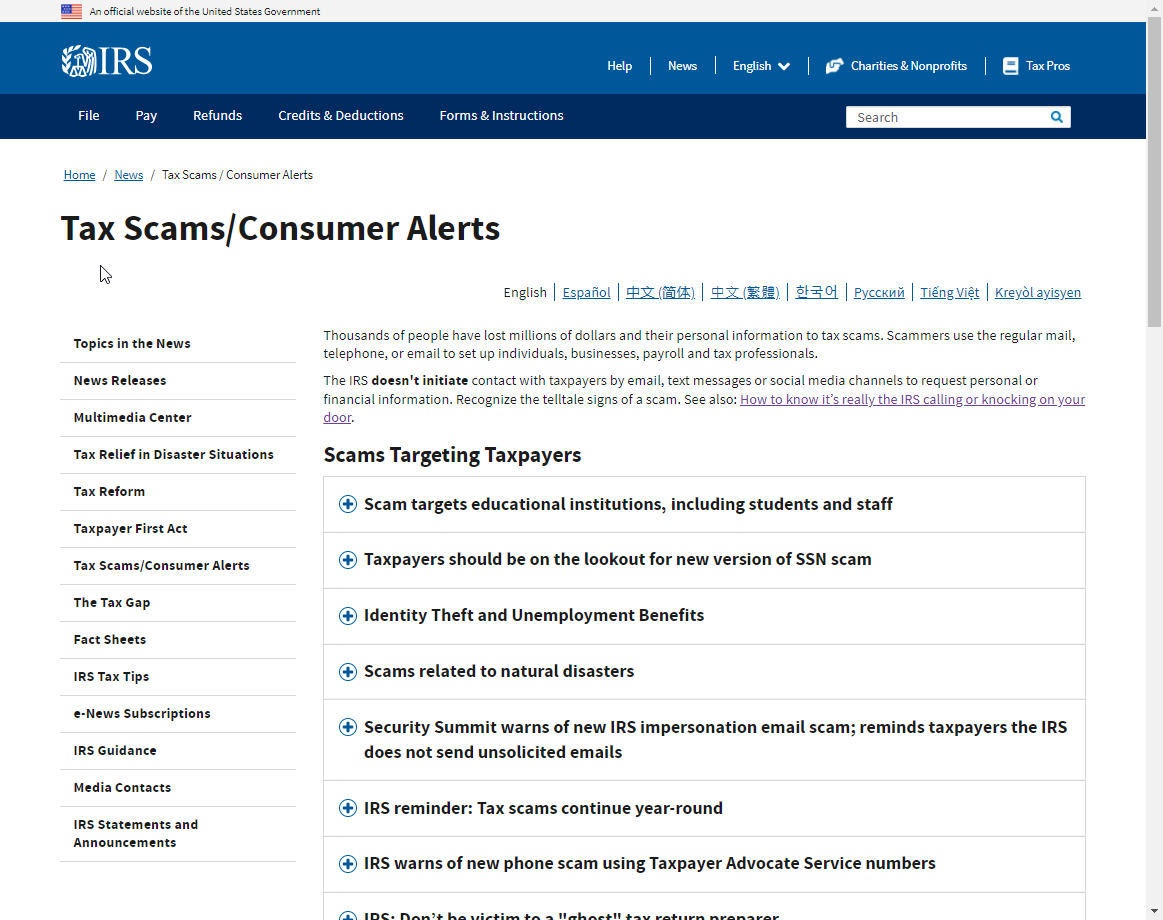How to Recognize When Government Notifications are Actually a Scam
The news the last few weeks has been saturated with stories about security threats and risks. Some victims are still being affected by the Kaseya hack from several weeks ago. Those without recent backups may be left in the lurch as ransomware gangs disappear or shut down. A recent Windows vulnerability has left password hashes exposed. A law firm handling cases for some Fortune 500 and Global 500 companies disclosed a ransomware attack that compromised a great deal of client information. Unfortunately, this list could go on and on.
While all of those are important to know about, what caught my attention last week was a social media post. In it the local police department discussed how a community member had been scammed into giving away their life savings. So instead of going in depth about the items above, this post is for everyone as it shares ways you can recognize when a notification coming from a government entity is in fact a scam.
How to Recognize When Government Notifications are Actually a Scam
It is important to explain in this post the term government relates to any entity from which you must follow certain regulations and from whom communication is plausible. This could be the IRS, your local city, county, state or other.
A common scam people get caught up in happens because hackers manipulate the average person's fear of owing to the IRS. The IRS is a big target for scammers as most adults make enough money that they must file taxes annually. Even if you submit every form required for yourself, your family, your business, etc., there is always a possibility that a mistake was made.
This is exactly what scammers latch on to - an individual's fear that it is possible a mistake was made, that they missed a payment or some other form. The fact that the average person has only a loose understanding of tax law puts people at a disadvantage which can lead to fear. Unfortunately this lack of information is what scammers exploit.
One of the best things you can do to protect yourself is slow the process down if you receive a call or communication from someone claiming to be a government agency. Consider infomercials - they rely on getting people to "Act now!", "Before it is too late", as "There will never be a price lower than this", etc. What do all of those statements have in common? Their purpose is to get people to act without stopping to think, without questioning if they need three sets of widget X. Scammers use the same sense of urgency in hopes of getting victims to respond without thinking - but instead of excitement, they use fear.
Whenever possible:
- Ask to call them back or get back to them when you can address the issue.
- Gather any information you can from them without giving any personal information. If they ask for personal information explain you do not have access to it, you cannot remember, or you are not authorized to give out that information. If/when the caller gets angry, threatens or becomes demonstrative - the odds are very high it is a scam.
- Find the real information for the represented agency and contact them to find out if the call was legitimate.
- If the contact was a scam, ask which department you can speak with to explain what happened so they are aware of the scam.
- Without going into too much detail, share your experience with others to help protect them from being scammed.
Luckily, beyond getting out of an immediate situation, there are several things you can do to protect yourself and determine if a notification from a government agency is a scam.
Things to keep in mind if you receive "communication" from a government agency
Government agencies will almost ALWAYS communicate with you via regular postal mail
There are several reasons why most government agencies communicate using postal mail. Most of these notices are generated automatically by software applications. Additionally, mailing communications leaves a record that customer support can access when someone makes an inquiry.
Per the IRS website, they will "never initiate contact via email, text message, or social media channels to request personal or financial information". While they do not say they will never call you, the odds of this are extremely low and only occurs in special circumstances.

Why scammers do not often use postal mail
There are several reasons why scammers do not typically use postal mail. First, as stated by the United States Postal Inspection Service, "Any fraud that uses the US Mail®—whether it originates in the mail, by phone, or online—is mail fraud". This is also why when scammers convince a victim to purchase gift cards, they do not ask for them to be mailed - they want the numbers over the phone. Yes this is faster, but it also avoids mail fraud.
Also, getting a call from someone who represents themselves as a representative of a government agency, who would have power over your livelihood, can be nerve wracking. If a random person walked up to you and said they worked with the city and you owed money and were going to get kicked out of your home if you did not pay immediately (either cash or going into a store to get gift cards), you would likely get away from them as quickly as possible. Yet a stranger calling on the phone or sending a message often gets treated differently.
The most important takeaway is to ask questions and NOT get caught up in the moment and give up personal information. Also, end the call/communication as quickly as possible. Contact the agency directly to get to the bottom of it. Government agencies are not meant to be scary or cause fear, they are people doing their jobs like everyone else, and they are there to help you if you ever do have a problem.
A government agency will never ask you to pay in gift cards
Government agencies cannot pay down your fees with gift cards. Just as you cannot go into a grocery store and buy groceries with a gift card from a restaurant down the street, a government agency will not accept gift cards. If someone contacts you and asks you to pay off your debt this way, it is 100% a scam.
The IRS will not threaten you
Even if you receive a legitimate communication from the IRS, keep in mind they DO NOT resort to threatening people. The letter will include a notification number and date, your information, the purpose of the letter, an explanation of what has happened, the information they have related to the incident, what you need to do in response to what has happened, a phone number to contact them about the issue, and what will happen if you continue to disregard such communications.
Ignoring the communications usually leads to greater penalties, most often a small percentage based on what you owe, which will continue to accumulate if not dealt with. Still, these are not in any way threats, they are simply notices with fees that continue to increase. This is not to downplay their importance or say that very bad things will not happen because they can, but a government agency will not issue threats, they will simply inform you of what is happening/will happen.
Having contacted the IRS after receiving a letter it is easy to share that people were helpful and informative and there was nothing about the call that felt threatening, pushy, or otherwise manipulative. This is another way to identify someone contacting you is a scammer - they deal in fear and often using bullying tactics.
What you should do if you are contacted (legit or scam)
If you do receive a call from a government agency, whether legitimate or not, you have the right to ask to call back and do not give out any personal information. This will provide time for you to contact the agency claiming to contact you, by using their website contact information to verify if the communication is legitimate or not.
If you know someone attempted to scam you, report these to the appropriate agency(ies) where applicable.
Important links
IRS Report Phishing and Online Scams
US Postal Service Mail Fraud Scams and Tips
What if the agency is legit?
Whatever you do, do not avoid paying fees you owe to government agencies! The worst thing you can do is avoid a government agency whether you missed submitting payments or forms, etc. Whatever the issue, they will typically work with you to create a plan to move forward that is in everyone's best interest.
Unfortunately, scamming people by pretending to be a representative of a government agency is not new or likely to go away anytime soon. Until these scams fail to be profitable, they will continue. What can help is to share our experiences with those agencies being misrepresented so they can inform and protect others.
Some communities are greater targets, such as the elderly and non-native speakers. If you know anyone in this demographic, share information with them about these scams so they are aware. Tell them if they are ever contacted to reach out to you and help them get to the bottom of what is going on before they get scammed if they ever do call on you.
As with many things, we are all in this together and can help one another if we stay in contact and warn each other of possible scams!

